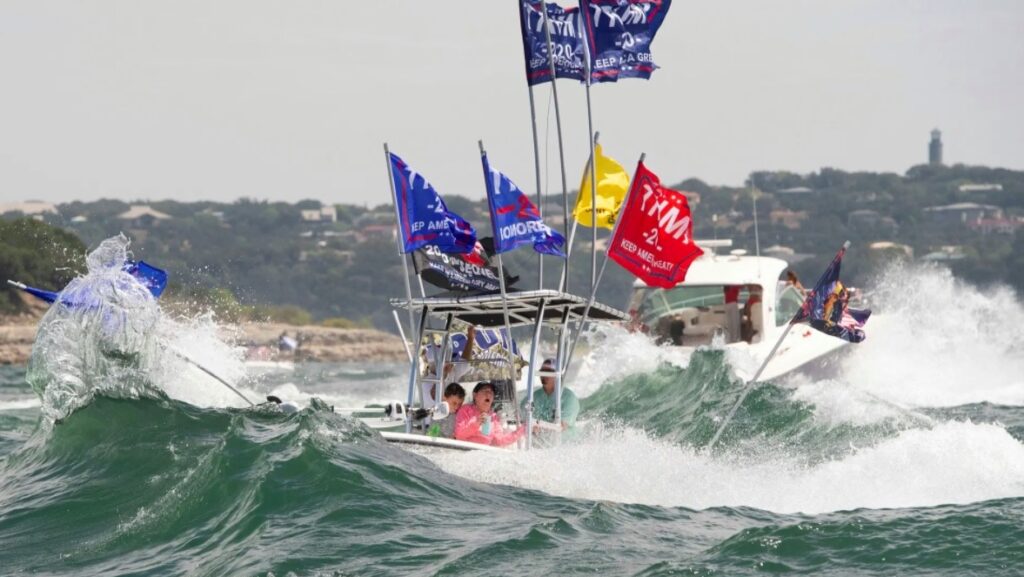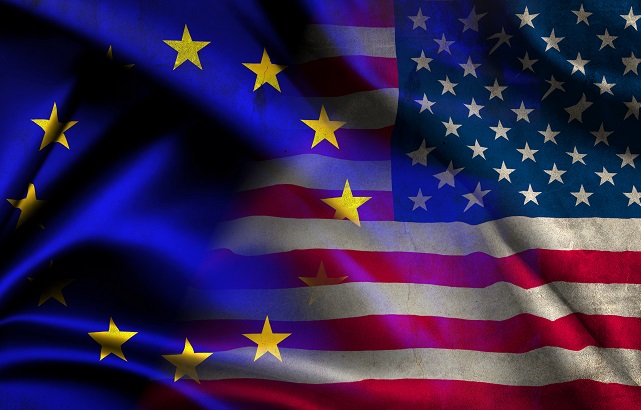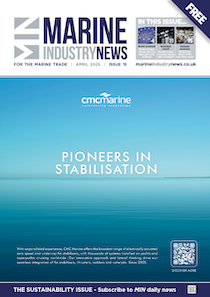Reactions to Trump tariffs chose cautious tone as some consumers adopt ‘buy local’ policies

It’s the word on everybody’s lips. Tariffs. The effects of Donald Trump’s so-called Liberation Day have sent stock markets reeling, global media into a tailspin, and consumers to adopt Trump’s very own policy of rejecting global trade and advocating ‘buying **insert own country name here**’.
The latest set of US-based trade measures is due to come into effect tomorrow (5 April 2025). They include a universal 10 per cent tariff on imports from all countries, along with additional tariffs on specific trading partners based on the US administration’s trade assessments, which will take effect on 9 April.
According to the Financial Times, to calculate the tariffs, Trump’s ‘crack team of trade investigators’ seems to have taken the US’s goods trade deficit with any particular country and divided it by the total amount of goods imported from that country. Then, they’ve cut the percentage in half, and that’s the US’s reciprocal tariff rate. It’s bewildering to many.
Trump stated that the new actions are intended to address trade imbalances and support increased domestic production. The updated tariff structure includes a 20 per cent tariff on imports from the European Union, a 24 per cent tariff on goods from Japan, and a 26 per cent tariff on imports from India. Chinese goods will be subject to a 34 per cent tariff, in addition to the previously imposed 20 per cent duties as well as existing Section 301 tariffs. Additional tariffs for Canada and Mexico were not announced.
American marine manufacturers association issues cautious statement
“The United States is home to the world’s largest recreational boating market — and we’re proud to be an American-made industry, with 95 per cent of boats sold here built here,” says Frank Hugelmeyer, president and CEO of the National Marine Manufacturers Association (NMMA).
The size of the US home market is set to become increasingly important to US manufacturers as overseas sales fall away, and boatbuilders will need to adopt strategies to pick up the shortfall.
Hugelmeyer says NMMA “looks forward” to working with the Trump administration to “ensure policy decisions protect small businesses, strengthen our supply chain, and propel the US recreational boating industry forward.
“As a leading domestic manufacturing industry with worldwide demand, our success depends on a stable, integrated supply chain, which is why we strongly support efforts to strengthen US manufacturing and expand access to global markets.”
He also notes that in a world of global challenges — from inflation and high interest rates to shifting trade dynamics — marine manufacturers are adapting, but transitions take time. “Our industry needs the right tools and policies to remain competitive without sacrificing American jobs or production.” Currently, the industry is estimated to have 812,000 workers across 36,000 businesses.
Anti-American sentiment experienced by sail maker
In the UK, Rob Kemp, from Kemp Sails, says he’s had multiple calls from customers looking to ascertain where the material being used for their sails is from. And several have asked not to have material from the USA used for their projects. But Kemp believes it’s a wider reaction than just to the tariffs.
“I don’t think it’s tariffs that has upset them, I think it’s Mr Trump who’s made them anti-American.”
The company makes sails and covers for yachts 18-100 feet plus. Its main manufacturing area is in Wareham, Dorset, with another unit in Gosport, Hampshire.
Kemp doesn’t think that he’ll have that many more customers switching fabrics. He says that the choice is too limited. “Whether it’s canvas or sail fabric, it’s a pretty limited market as to where it comes from, and very little of it is actually made in America. It’s the performance laminates that are often American.
“It [tariffs] may have an effect on the race boat market, because a lot of the racing sails are built in Arizona, but I don’t think we’ll see much. I think it’s a knee-jerk reaction.”
Kemp says the company is very strong on its ‘made in Britain’ credentials. “Some of our customers don’t care where it’s made, they’re just driven by price. Other people are very loyal to UK manufacturing.
“It’s quite polarised. People don’t care, or they really care. No one sits on the fence. It’s something we’ve focused on a lot as we’re proud to make in the UK. But there are limited places that you can get the materials.”
Marine companies aim to absorb some tariff costs in the short term
Luke Morrison (pictured), CEO of Rooster, says the company was prepared for tariffs.
“When it comes to the USA, we filled a couple of containers late last year to make sure we weathered the immediate problems of additional tariffs. But clearly, if we’re sending goods from either China or the UK to the US, there are more tariffs, and we have to absorb that.

“I have a container leaving this week [for the USA] and it will be subject to an additional 34 per cent tariff, which is already on top of the 25 per cent tariff that Trump brought in during his first term.
“Inevitably this will increase retail prices to a degree but we’re also absorbing some to some degree as well.”
Which means Morrison and Rooster keep adapting.
Morrison’s frustrated that he’s not seeing an appetite to help businesses deal with these sorts of things in the medium term from any political angle.
“Over the last few years, we’ve absorbed costs and our customers have absorbed costs as well. We have a positive outlook. We always have, we always will.
“At Rooster, we remain proactive and customer-focused. We’re committed to supporting our network through strong marketing, regular participation in key industry events, and a wide range of impactful sponsorships. By staying visible and engaged in the market, we reinforce confidence in the brand — and we continue to see customers investing in Rooster products as a result.”
“It’s just a more challenging environment and we all have to work a lot harder for it.”
Superyacht sales put on hold as markets adjust
“This [tariffs] will undoubtedly impact companies importing yachts into the US, particularly large builders which rely heavily on the American market for a significant portion of their annual sales,” Alex Clarke of Denison Yachting told Superyacht Times. European shipyards such as Sanlorenzo, Ferretti Group, Lürssen, Feadship and Sunseeker have delivered projects to US clients in recent years. “The same applies to British brands such as Princess Yachts and Sunseeker, which have a strong presence in the US.
“The approach for new-builds purchased by American buyers in foreign countries such as Italy, Turkey, or Northern Europe will remain unchanged. These yachts will continue to be foreign-flagged, with ownership often structured through foreign corporations for tax and liability purposes.”
Clarke continues: “The final outcome and impact of the tariffs will take time to unfold as markets adjust and countries potentially reciprocate with increased taxes, so we are far from reaching a definitive resolution. However, it is clear that the tariffs are already having a negative effect, as many American buyers have temporarily put their yacht purchases on hold to assess the situation. Buyers are becoming more cautious, with some choosing to delay purchases until the markets stabilise.”
Strategic approach needed for trade policies

NMMA says it continues to advocate for a targeted, strategic approach to trade policies, one that enhances US global leadership while minimising disruption for domestic producers. It says: ‘The recreational boating industry is a proudly made-in-America sector that contributes $230 billion in annual economic impact’.
Meanwhile, British Marine says its public affairs team is working closely with officials in the Department of Business & Trade, as well as colleagues in the European Boating Industry (EBI), NMMA and the International Council of Marine Industries to assess the implications the latest US tariffs, and potential retaliatory measures, will have on the marine sector.
‘Assessing the impact that these new additional tariffs will have on UK marine exports is challenging especially as our industry’s supply chain, and the wider UK economy, will also be affected by tariffs the US is applying elsewhere and other subsequent counter measures,’ says an online statement. ‘For example, the additional 34 per cent tariffs being applied to China and, perhaps most crucially for our sector, its 20 per cent tariffs on all goods from the European Union – our industry’s main export region, which accounted for 44 per cent of all UK marine exports in 2022/23.’
Costs of doing business with US set to increase drastically
“The cost of doing business with the United States will drastically increase,” says Ursula von der Leyen, president of the European Commission. Unlike some, she is not pulling any punches.
“And what is more, there seems to be no order in the disorder. No clear path through the complexity and chaos that is being created as all US trading partners are hit.”
She continues: “Let’s be clear-eyed about the immense consequences. The global economy will massively suffer. Uncertainty will spiral and trigger the rise of further protectionism. The consequences will be dire for millions of people around the globe. . . The tariffs will also hurt consumers around the world. It will be felt immediately. . . Inflation will go up. . . All businesses – big and small – will suffer from day one. From greater uncertainty to the disruption of supply chains to burdensome bureaucracy.
“We know that the global trading system has serious deficiencies. I agree with President Trump that others are taking unfair advantage of the current rules. And I am ready to support any efforts to make the global trading system fit for the realities of the global economy. But I also want to be clear: Reaching for tariffs as your first and last tool will not fix it. That is why, from the outset, we have always been ready to negotiate with the US, to remove any remaining barriers to transatlantic trade.”
She says the European Commission is finalising a first package of countermeasures in response to tariffs on steel and looking at further countermeasures, because the EU cannot absorb global overcapacity nor will it accept dumping on the market.
Tariffs disrupt marine businesses and jeopardise jobs
Yesterday, the European Boating Industry said it strongly opposes tariffs as they disrupt businesses, hinder economic growth, and jeopardise jobs, particularly for small and medium-sized enterprises (SMEs) that form the backbone of the boating industry.
‘We welcome the EU’s objective to reach a negotiated solution with the US and EBI stands ready to contribute with proposals to enhance the recreational boating industry’s mutual success,’ said the organisation’s statement. ‘The permanent removal of tariffs would support economic growth, jobs and investment on both sides of the Atlantic.’
It also says the recreational boating industry ‘Made In Europe’, consists of over 32,000 businesses and directly employs more than 280,000 people. Over 96 per cent of businesses in the sector are SMEs.
Economic uncertainty already affecting marine market
From the close of 2024 to first quarter 2025, economic volatility has had a noticeable impact on consumer sentiment, says NMMA Canada. It releases a monthly recreational boating industry data summary report, which offers an analysis of recreational boating powerboat unit sales and key economic indicators. The latest report shows declining retail sales. From January to December 2024, new powerboat retail unit sales fell by 9.1 per cent, totalling 231,576 units — a significant year-over-year decline influenced by economic pressures and fluctuating consumer confidence.
NMMA Canada says there are concerns over market stability and continued uncertainty. That’s on top of earlier findings from Info-Link Technologies, which recently reported that as of year-end 2024, the median age of current boat owners in the US is 60 years old, with more boat owners in their 70s than in their 40s. Info-Link’s Jack Ellis noted, “Many of the people who owned boats 25 years ago are the same people who own boats today, but they’re 25 years older.”
Main image and Trump flag image courtesy of footage from ABC7, via YouTube.













